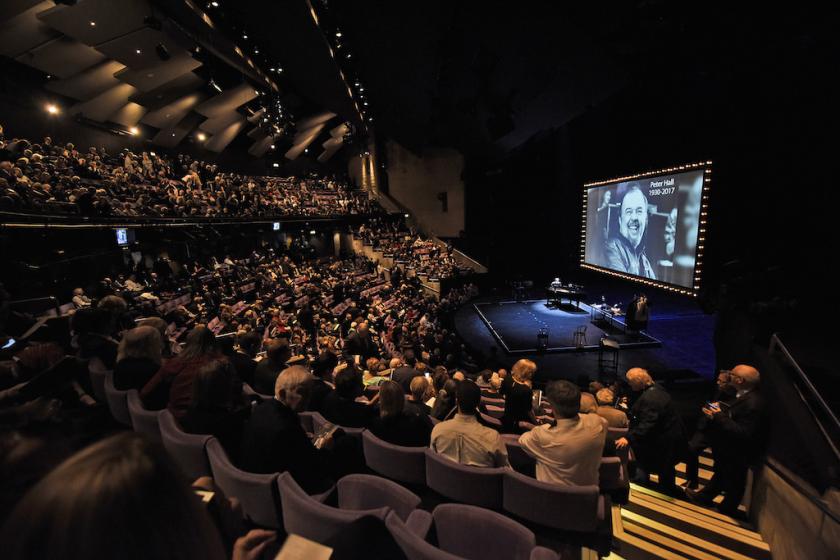Sir Peter Hall had no ordinary life, as might be expected from the director who more than any other defined the British theatre of the last half of the 20th century. The same can be said of the unforgettable two-part send-off he received exactly a year on from his death in 2017, age 86. Yesterday's events coupled a properly weighty memorial service at Westminster Abbey with a looser, larkier afternoon knees-up at the National Theatre, his onetime home. Both occasions felt absolutely true to Hall’s capacious and protean spirit.
The midday gathering at Westminster found a steady stream of notables arriving through the impressive portals of a building last pressed into usage of this sort for Hall’s predecessor at the National, Laurence Olivier, in 1989. (I recall that one including its fair share of politicos, tellingly absent from the Hall assemblage.) Both reverent and resonant, the Abbey programme combined musical selections from Tippett (heaven!), Britten, Mozart, Bach and Vaughan Williams, performed by the London Philharmonic Orchestra under Vladimir Jurowski, the Monteverdi Choir under John Eliot Gardiner, and the choristers of the Abbey. These were interspersed with various, ever-apt readings and reminiscences. Judi Dench, her dusky-voiced Cleopatra from Hall’s 1987 production forever imprinted on my mind, opened with a recitation from the play: "I dreamt there was an emperor Anthony./O, such another sleep, that i might see/But such another man!" (see video below). Vanessa Redgrave – a landmark Rosalind under Hall’s direction back in 1961 – took to a separate podium not long after for a reading from Corinthians ("Though I speak with the tongues of men and of angels...")
Eulogies were proffered by David Hare and Trevor Nunn. Hare, a veteran of the five National Theatre regimes from Hall onwards, reminded those present that a man revered for his classicism also possessed an abiding appreciation of new work. By way of example, Hare listed a lengthy roll call of contemporary writers produced under Hall’s watch. The 71-year-old scribe rather surprisingly kept himself off the list at least at first, before recalling Hall’s devotion to Hare’s 1978 play Plenty within the National Theatre repertory despite begrudging reviews – the same play, and production, that later went on to triumph in New York (see video below).
Nunn spoke from the unique position of being Hall’s close friend and acolyte, as well as following him into the top posts first at the Royal Shakespeare Company and, later, the National. Peppering his tribute with purposefully chosen snippets from Hamlet ("what a piece of work is a man"), Nunn acknowledged a one-off “polymath” in Hall whose most lasting production, so to speak, could be said to be his large, wide-ranging family. As if on cue, daughter Rebecca’s newborn could be heard squealing on occasion.
Four-times married and with all three ex-wives in attendance (wife number three, opera singer Maria Ewing, closed out the National proceedings with some Poulenc), Hall was poignantly commemorated by each of his children in turn; the crack in daughter Lucy’s voice evoked the human cost that accompanies any death and as a reminder that this cultural colossus was also a much-admired and loved father. How fitting, then, that yet a further generation of the Hall dynasty – his grandson Ben Hall, about to open as Henry V at the Tobacco Factory in Bristol – appeared at the very end to fill in for an indisposed Ian Holm in a reading of Puck's farewell from A Midsummer Night's Dream: the family circle, as it were, completed. Ben's grandfather would have been proud.
A smoked salmon sandwich or two in the National foyer later, and a subset of the lunchtime crowd converged in the Olivier auditorium for the sort of winning retrospective that the British theatre does so well. (Their previous one in March 2017, in tribute to Hall’s friend and colleague Peter Shaffer, boasted many of the same people, including Ian McKellen, Maggie Smith, and a sonorously spoken compere in Simon Callow.)
Given fewer constraints on time, further reminiscences came from Richard Eyre and a wonderfully expansive and candid Bill Kenwright, who became Hall’s commercial benefactor once Hall’s pioneering inroads into the world of the subsidised theatre had come to an end. Perhaps the single most striking vignette of the entire day was Kenwright’s recollection of falling out with Hall, only for both men to admit upon a later meeting that what each one had wanted from the other was nothing more or less than a hug.
We got inimitable snippets from Waiting for Godot and No Man’s Land (Ian McKellen at his most gloriously impish opposite Patrick Stewart), two plays Hall placed indelibly on the map, as well as direct expressions of affection, and thanks, from the director Thea Sharrock and the actor Dan Stevens. “Today is a moment in history,” said Sharrock with unadorned forthrightness and so, in every way, it was.














